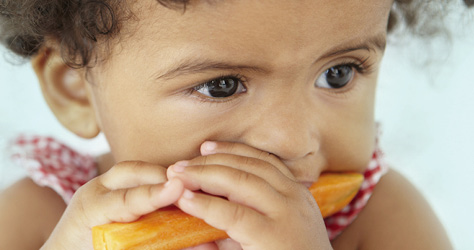Our guide to the foods your toddler needs.
You've sailed through weaning, and now your toddler is happily eating a totally balanced diet... No? Don’t worry, you’re not alone. Follow our five steps to achieving a realistic, healthy diet.
At a glance
- What kinds of foods does your toddler need
- What a balanced diet contains
- Tops tips for ensuring a healthy diet for your toddler
- Healthy snacking

What your toddler needs
A balanced diet for a toddler isn’t a world away from ours, although there are a few important differences. Here’s what they need:
Fruit and vegetables: Include at every meal as they contain lots of vitamins, minerals and fibre. Different fruits and vegetables contain different vitamins and minerals so it’s best if they eat a wide variety. If you’re not there yet, don’t worry: aim to build it up over time by introducing new tastes alongside food they already like.
Carbohydrates: Starchy foods like bread, rice, pasta, potatoes and couscous provide energy, nutrients and some fibre. Wholegrain foods contain more fibre but don’t give your toddler too much as it fills up their little tummies too much and can stop them eating other nutrient-rich foods.
Protein: They need one or two portions of protein a day. That could be meat, fish, eggs, pulses (lentils, hummus, tofu etc). It’s best to avoid whole nuts until they’re five. Aim for two portions of oily fish (such as mackerel, salmon and sardines) a week.
Dairy products: A good source of calcium and vitamin A; try to give three servings a day. Includes a drink of full-fat milk (300ml a day is recommended for toddlers aged 1-3), plus cheese, yoghurt or fromage frais. Don’t give them any low-fat products as children under two need the concentrated energy that comes from fat. Keep semi-skimmed milk for the over twos.
Five steps to a healthy toddler diet
Don’t worry if their appetite has dropped
Around your baby’s first birthday, their growth rate slows so they may not be as hungry. They’re also so busy exploring that sometimes they’re not that bothered about food. That may mean they eat one good meal, followed by one or two picky disasters (especially if they’re tired). Best not to worry – this is quite normal. They don’t have to eat a totally balanced diet at every meal: instead, look at what they’ve eaten across the week to reassure yourself. Keep meals small-ish if their appetite is low (their tummy is still very small), and give two or three healthy snacks a day, but not within an hour of a meal or they definitely won’t eat anything.
Embrace the world of healthy snacks
A good snack might be a piece of cheese, an oatcake or rice cake, a breadstick, cucumber or carrot stick or cherry tomato cut in half. Toddlers universally love dips, so you could try carrots/breadsticks with hummus, plain Greek yoghurt and cucumber, or a mashed avocado dip.
Fruit is good but try not to give more than one or two small portions a day as it’s full of natural sugars. Avoid raisins unless they’re with a meal as they are packed with sugar and are very bad for your toddler’s teeth.
Yes, it’s still a messy business
Not all the food your toddler intends to go into their mouth will actually reach there. By 12 months most are able to eat food with their fingers. Their back teeth may have come through, so chewing becomes easier.
During the next year, they’ll gradually get better at using a spoon but will still need your help, especially when they’re really hungry and just can’t manage to get it in fast enough. It makes sense to chop up their food – especially meat – into small pieces to keep frustration at bay.
Watch their drinks
Stick to water and milk at mealtimes. Avoid fizzy drinks, milkshake, squash, fruit drinks and neat fruit juice as they contain a lot of calories and sugar, and may leave your toddler feeling too full to eat proper meals which are far more nutritious.
From ages one to three, they still need 300ml of milk a day, but if your toddler is drinking way above that, they may not want much food, which at this stage is the best source of nutrients, vitamins and minerals for them. Drinking too much milk at this stage and not eating enough protein-rich food like meat and fish can put them at risk of an iron deficiency.
Have some fun
There’s a window between about 9-10 months when they’re fully weaned and 18-24 months when some toddlers get fussy to introduce lots of new foods and textures. Keep offering different foods and have some fun experimenting with presentation.
An ordinary sandwich can be turned into an unmissable feast with the aid of a couple of heart or dinosaur-shaped cookie cutters. That’s not to say you have to turn every meal into a work of art (way too much pressure) but it can help save a bad day.
Making smiley faces with fruit and veg is another sure-fire winner; get them to create their own faces (cue cries of ‘oh no, he’s eating the nose!’).
Sit down with them and chat
Even if you’re not eating. As your toddler gets nearer two, it’s great practice for them to join you for family meals. Few families can manage this every day, but even once or twice a week can benefit them.
Read more about family meals.